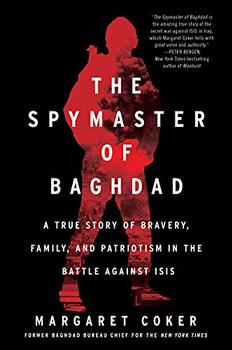Summary | Excerpt | Reading Guide | Reviews | Beyond the Book | Readalikes | Genres & Themes | Author Bio

A True Story of Bravery, Family, and Patriotism in the Battle against ISIS
by Margaret Coker
Munaf was at school when, around lunchtime, the principal announced that classes had been canceled. The boys were ordered to walk straight home without stopping. No soccer. No snacks at the corner market.
What they didn't know was this: less than three miles away, two battalions of Iraqi national guard and an army mechanized infantry unit had crawled into the district, tearing up the tarmac of the district's main street and occupying the central bridge that divided Saddam City from central Baghdad. Commanders had orders to restore calm. They and their men, the vast majority of whom were Sunnis from different parts of the country, knew failure was not an option. The deep boom of heavy artillery echoed through the narrow streets followed by the dull thuds of high-powered automatic rifles hitting their target, the people who had been praying at Imam Hussein Mosque.
The men and women who were inside the mosque tried to flee, but when they reached the streets they were torn apart by a hailstorm of bullets. The soldiers had set up a kill zone a dozen blocks wide and there was nowhere to hide. People lucky enough to escape with injuries didn't dare go to the hospital. The mukhabarat was scouring all of Saddam City's medical facilities for people with bullet wounds or shrapnel injuries. Either proved that the patient was a terrorist, they told the nurses, and they would be arrested and taken away.
For three days Abu Harith forbade his sons from leaving their house. The tanks had rolled back across the bridge, but the regime's message lingered like the stench of the bodies left in the streets by families too frightened to retrieve them. They could come for you at any time.
Abu Harith would not take the chance that one of his sons would be caught in the regime's dragnet. No one in the al-Sudani family had ever been arrested, even in the churning political foment of the 1980s. He wanted to keep it that way.
For Munaf, the afternoon rally in April 2003 began to thaw the emotions that had been frozen in the grip of his father's fear. With the dictator gone, the residents of eastern Baghdad renamed their district Sadr City, in honor of their martyred ayatollah. The surge of hope lifted taboos ingrained for a generation. Some Iraqis cowered at the new era of uncertainty. Others jumped at opportunities created in the tumult. The borders were wide open for trading for the first time in a decade. Many families in Sadr City opened small businesses selling building materials, used cars, and appliances, commodities that for years had been available only on the black market but that every Iraqi needed and now wanted.
The transformation of the country also overturned the al-Sudanis' family dynamics. After Harith announced that he had flunked out of university, Munaf was no longer an afterthought for his father. In fact, for the first time in his life, the third-born son found himself the object of his father's attention. Abu Harith desperately wanted one of his other sons to cleanse what he considered a stain on the family honor, and nineteen-year-old Munaf had strong grades and much promise. He wasn't interested in a career in business or in academics, though. In 2004, shortly after he had graduated from high school, Munaf brought home a flyer advertising jobs with the new Iraqi police force. The slogan at the top of the paper was elegant and moving. Defend your country—Defend your people.
Munaf knew that mission was a worthy argument to give his father, the pitch that would allow him to follow his dream. A year later, he was enrolled in the new Iraqi police academy, and was on track to becoming one of the first cadets of the nation's young democracy.
Excerpted from The Spymaster of Baghdad by Margaret Coker. Copyright © 2021 by Margaret Coker. Excerpted by permission of Dey Street Books. All rights reserved. No part of this excerpt may be reproduced or reprinted without permission in writing from the publisher.
Your guide toexceptional books
BookBrowse seeks out and recommends the best in contemporary fiction and nonfiction—books that not only engage and entertain but also deepen our understanding of ourselves and the world around us.